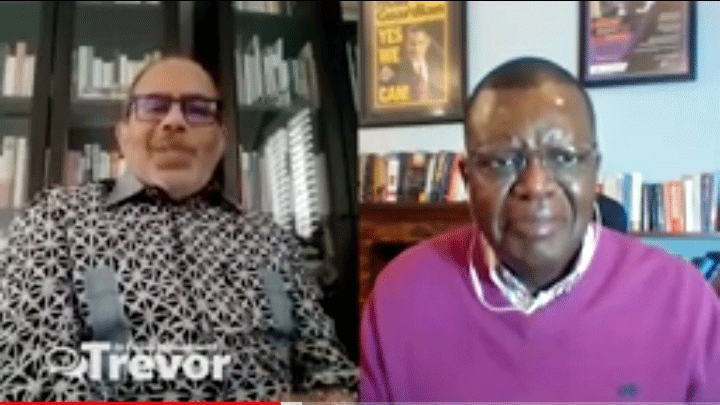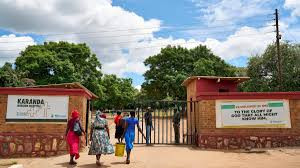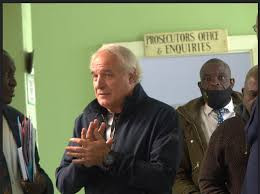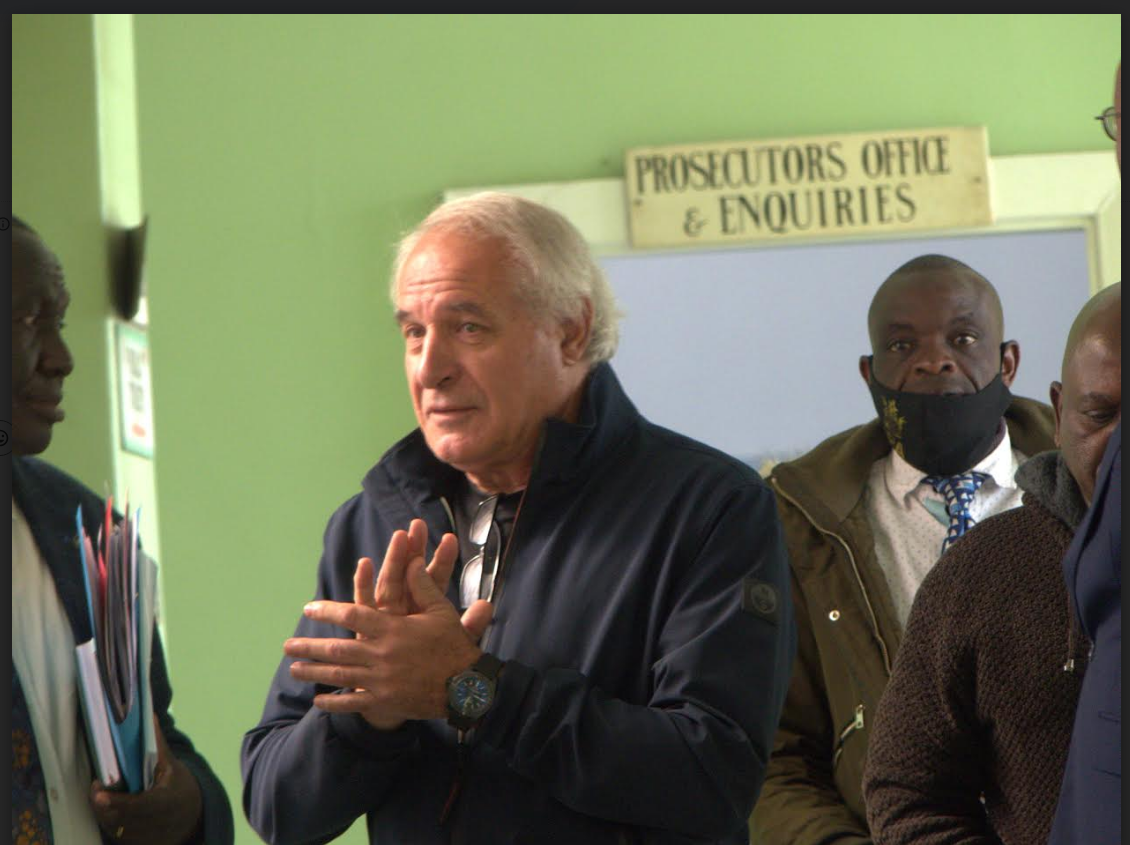
Former UNDP resident representative in Zimbabwe, Carlos Lopes (CL), has difficulties in understanding how Zimbabwe finds its self in the current economic crisis and yet the country used to be the second most industrialised in Africa.
Lopes, a former Executive Secretary of the Economic Commission for Africa at the African Union, told Alpha Media Holdings chairman Trevor Ncube’s In Conversation with Trevor that a lot of bad management over many years ended up dismantling Zimbabwe’s once sophisticated economy.
Below are excerpts from the interview.
TN: Carlos Lopes, welcome to In Conversation with Trevor. I am excited to have you in this show and thank you for creating time to join me.
CL: Thank you for inviting me!
TN: It is absolutely a pleasure. Carlos, you have had an amazing career, starting off where you were born in Guinea-Bissau, in serving the continent and serving the international community. I want us to begin where your life started, which is being born in Guinea-Bissau in this village of 10 000 people which you proudly call a city, talk to me about your beginnings, how that city of 10 000 people contributed to who Carlos has become.
CL: Well, I am very proud of my origins. I think individuals shape themselves in terms of how they position in relation to the world and others and by respecting their origins. But my little village, which is still very poor, in the northern part of Guinea-Bissau, was actually a place that has contributed historically for the country in many ways. My father was involved in politics and beyond, but apart from his own personal inspiration to me, I was very much marked by the characteristics of my earlier life which was very rural until I started going to primary school. Of course, I evolved in a country that was not independent and became independent when I was 13. I got involved in politics because it was a moment of excitement and we became adults very early. There was no time for childhood, we had to immediately embrace the excitement and I think that has shaped what I am in many ways.
TN: And you say, Carlos, and I quote you, “a lot has been done incorrectly by Africans, but much more has been inflicted on them”. There is a lot that Africa has done right and it’s about time that we construct our own narrative. What is that narrative that we want to construct and sell to the world in this particular moment?
- Chamisa under fire over US$120K donation
- Mavhunga puts DeMbare into Chibuku quarterfinals
- Pension funds bet on Cabora Bassa oilfields
- Councils defy govt fire tender directive
Keep Reading
CN: I think it is a narrative of self-confidence that has been demonstrated by Africans, some leaders in the continent; it’s not about not caring on the image projections that we make and what people think about Africa, about us, it’s not about that. It’s about just making sure that we have the urgency to speak like they do, then we are equals and this narrative of equality has been appropriated by external actors of Africa, so they want to please us. They say a partnership amongst equals or something amongst equals to such an extent that we are almost afraid of saying the same because we detect some sort of bizarre paradox. The more we are basically manipulated or we are taken for granted, we are considered equals.
TN: It’s interesting again talking about leadership, Carlos, how the speed with which the African trading areas are debated and adopted into an instrument in a document. There tends to be a confluence, a meeting of opportunities between good leaders in the continent; leaders that are interested in democracy and implementation and what is good for the people and the good fortunes of Africa. How important is leadership in driving Africa forward?
CL: It’s essential and I like to divide African leaders into two categories: the category of the rent-seekers and category of transformers. You have the rent-seekers trying to keep things as they are; public resources are not really devoted to transformation of their societies, their economies and they are fine with most of the resources coming from commodities or some source that does not really necessitate transformation of the state.
TN: Interestingly, I know that you are also passionate about energy renewal and walking away from fossil fuel. Africa has been hit by two negative factors, one is Covid-19. In your assessment, how do you rate the way Africa has reacted to Covid-19?
CL: Well, in fact, I can expand your figure to 16 out of the 30, best performing economies, are going to be African according to the IMF forecast for 2020 of January last year and look how much has changed since.
Well, I think the African countries have reacted very quickly, but not necessarily in a very efficient way. They immediately went for lockdowns conformities, which is the response to the sanitary dimensions of the crisis of Covid-19. I do believe and continue to say this, that the Covid-19 crisis in Africa is going to be much more of the economic impact and less about the sanitary impact.
TN: So, you are talking about the African response being one-size-fit all sanitary response rather than the economic response and the stimulus packages that are coming from the West? What is it that we are supposed to be doing to respond in a manner that protects the economy and livelihoods?
CL: I think we have to go to the full extent of what is possible and what is possible is definitely for us to increase our physical diversity towards certain extents. And another thing that we have to do is basically to negotiate better the systemic issues that are impeding Africa from taking advantage of monetary policy. Africa is by far the continent with the least flexibility when it comes to monetary policy. The good example to give normally are the least developed countries.
TN: Let’s move now, Carlos, to the relationship between Africa and China, which is full of tension. The way China treats Africans in China particularly after the outbreak of Covid-19 and then China going on to cancel or suspend debt payments for 77 developing countries. What game is China playing with Africa and is Africa ready to play this game with China?
CL: I think China is a major player in Africa, but Africa is not of major importance to China. The totality of Chinese investment in Africa accounts for about 4% of the Chinese investment in the world, so we are 4% for China; as much as Pakistan. Pakistan is also 4%. So we are an entire continent of 54 countries as much as Pakistan to China.
So, this skewed view that we had that we are so critical for China has to be corrected. In fact, China is getting a lot of market share for the cheap goods. It’s not very expensive to occupy space in Africa.
TN: In your view, what should we be doing as Africans in that triangular debate — where should we be positioning ourselves, are we present on the table at all or we are just recipients and receivers as usual?
CL: We should defend the same position as we defended in the WTO regarding HIV and Aids —virus.
TN: Let me bring you to a place you and I first met which is Zimbabwe. You were the resident representative of the UNDP in Zimbabwe for a very long time, sitting at the University of Cape Town and looking at Zimbabwe right now, what goes through your mind?
CL: A lot of pain, a lot of pain, lot of difficulties in understanding how a country that was second most industrialised in Africa finds itself in the kind of economic situation that Zimbabwe is right now and I don’t believe it is because of sanctions. I think it’s a lot a bad management over the many years that ended up dismantling some of the characteristics of Zimbabwe’s economy that was the most sophisticated in the most, starting with agriculture, obviously, but also going into the industrial sector and services. And I know that Zimbabwe is a very resilient country and has very resilient people. I do believe that once the right conditions are made, the recovery of Zimbabwe is going to be one of the fastest in the world. Why? Because of the quality of its human resources. I think the recovery of Zimbabwe is going to be possible also with a lot of contribution from its diaspora who have proven outside Zimbabwe to be amazing, just amazing and amongst the best in Africa.
TN: What advice would you have for our leaders, Carlos, from where you are and the experience you had in working in this country, those in power and those in opposition? What collective advice would you give to them?
CL: The political dialogue that is necessary in Zimbabwe has failed many. I wasn’t involved when in Zimbabwe, with the constitutional debate and at the time the constitution was proposed by the government that was voted for. It was a subject of some degree of consultation, not the ideal, but quite extensive and a proposed change in the regime that you know, after all is, what you know the Zimbabwe kept fighting for across almost three decades.
The debate about land ended up being a debate about politicians other than about land. Partly, the debate about land could have done wonders if it was centred on some of the things I just mentioned to you, Trevor, which is taxation. If you tax heavily land that is not used, it becomes a liability, so people would have gotten rid of it. We did not go through a very complicated political process to get such results. You can do it through taxation and find out the usage of land that you want in parts of the country in different areas and so on. And if it is not put to proper use, you tax heavily, cut liability, people get rid of it. So basically you can solve a lot of problems with strict policies. This is not that Zimbabweans are not intelligent. Zimbabweans are amongst those who have proven to have the most endurance to institutions for instance, when people were even discussing de-centralisation.
Zimbabwe had centralised government structures at the time and that was functioning. How do we resuscitate all this capital back through the political process?
For me, it is about, you know, a combination of actors. You need the courage of some actors, but you need also some changes in the institutions because institutions of the country have now been marked by these very difficult times and there is a need for refreshing to some of the approaches to discuss institutions set-ups in Zimbabwe in a more open, transparent manner.
TN: You said right now the challenges that Zimbabwe finds itself in are not primarily because of sanctions. But given the Covid-19 situation, there are some people that are saying even those that are under sanctions, the international community should come with a way of accommodating their needs. Where do you stand on that view, Carlos?
CL: I agree, I think it’s criminal to be penalising anything to do with sanitary dimensions because of political consideration. I think it’s criminal because the virus finds refuge in unsanitary conditions. So if a country does not have the means to fight it, it will obviously be the reservoir of the virus that you want to get rid of. With the globalisation levels that we have in a country like Zimbabwe, huge immune mobility, it is just nonsensical to be sanctioning the country on the basics of this type of consideration. I think it does not make any sense and it should be stopped.
l “In Conversation With Trevor” is a weekly show broadcast on YouTube.com//InConversationWithTrevor. Please get your free YouTube subscription to this channel. The conversations are sponsored by Titan Law.











